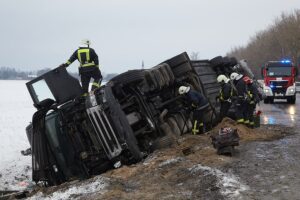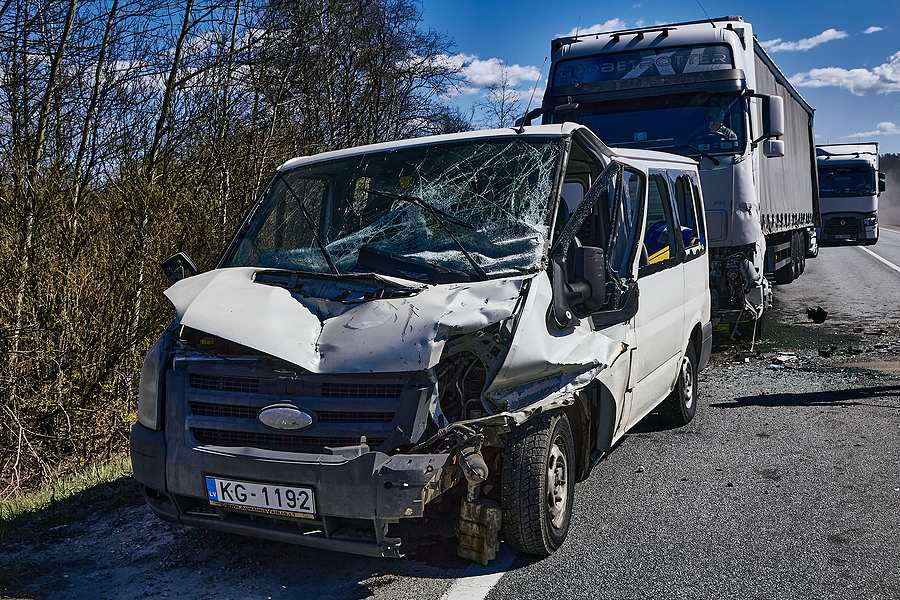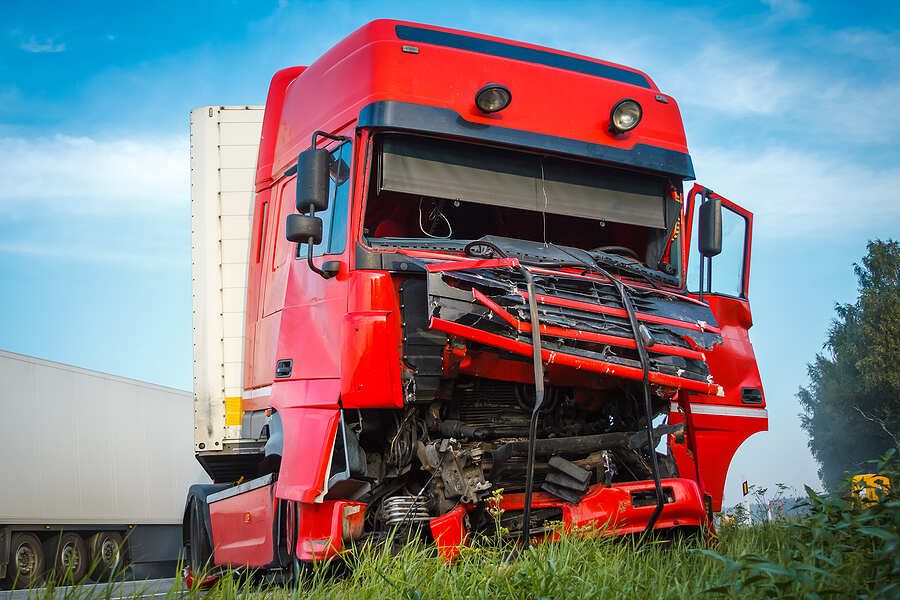 Truck accidents aren’t the same as accidents involving two similarly sized vehicles. The difference in size and weight between a large truck and a passenger vehicle means that the truck will hit the car with far more force than the smaller vehicle can tolerate. Most people who died in truck/car collisions were in the passenger vehicle.
Truck accidents aren’t the same as accidents involving two similarly sized vehicles. The difference in size and weight between a large truck and a passenger vehicle means that the truck will hit the car with far more force than the smaller vehicle can tolerate. Most people who died in truck/car collisions were in the passenger vehicle.
Size isn’t the only issue. Trucks can’t see those vehicles close around them, and they can’t stop quickly. In other words, when the truck driver finally does see your car, they won’t have much time to stop before crashing into you.
These physical complications and extremely complex liability issues, applicable federal regulations regarding truck driver performance affecting the outcome, and other complications make truck accidents very different from standard motor vehicle collisions.
For a free legal consultation, call 516-451-7900
Common Causes of Truck Accidents
As noted above, just the sheer size difference between your car and a big-rig commercial truck means that you are likely to be the loser in any confrontation with a truck. To avoid this losing battle, keep some of the causes of truck/car accidents in mind.
Truck driver error is the primary cause of truck accidents, but the following breaks that down a bit more.
- Speeding – Many trucking companies today use speed trackers or even speed limiters on their company big rigs. However, not all trucks or companies have installed this technology. The slowness of trucks in reacting to changes around them makes speeding all the more dangerous for passenger vehicles colliding with trucks.
- Distracted Driving – Distracted driving is the fastest-growing cause of accidents in the United States. In most locations, various distractions are illegal for most – if not all – drivers. Distractions can include cell phones, texting, GPS navigation devices, eating, applying makeup, and even playing games and watching movies on mobile devices. All of these distract a truck driver from the job of operating an 80,000-pound lethal weapon.
- Fatigued or Drowsy Driving – Statistics show that driving while sleep-deprived has the same impact on driving skills as does a high Blood Alcohol Count (BAC). Moreover, federal and state governments limit the number of consecutive hours that truck drivers can work in a given week. Truck drivers may not drive for more than 11 hours at a time without a 10-hour break. They also cannot drive more than 60 hours a week or 70 hours in eight days. Violations can constitute negligence or even recklessness.
- Aggressive Driving – Truck drivers spend a lot of time on the road, often under extreme pressure to reach their destination in a limited time. This constant stress can lead truck drivers to be more prone to road rage and aggression than other drivers. Aggressive acts like failing to yield or tailgating can be far more dangerous in a big rig than in a compact.
- Road and Weather Conditions – Bad weather and bad roads make controlling a tractor-trailer challenging. The weather can make it hard to see and hard to stop. Bad roads or construction can lead to poor visible and risky maneuvers to avoid construction debris. Both can be bad for a passenger vehicle or pile-up of cars that get in the way.
- Cargo Problems – Too much cargo or badly loaded cargo can change the truck’s center of gravity and make it harder to operate. When crews do not correctly load cargo, the truck is more likely to be in a rollover, endangering other vehicles and the truck driver. Overloading cargo can cause blowouts and loss of control. The overload can also cause a rollover and increase the stopping distance. If the load is on an open trailer, pieces of it can fall off, creating debris in the path of oncoming vehicles, which will swerve to avoid it or be struck by the falling cargo.
- Equipment Failure – The most common failure causing accidents is brake failure. An FMCSA study found that brake failure was a factor in one-fourth of truck accidents. If a truck cannot stop, it may demolish any vehicle in its way.
- Driving Under the Influence – Whether it’s alcohol, or legal or illegal drugs, driving under the influence diminishes the truck driver’s skill with their vehicle. The Federal Motor Carrier Safety Administration limits the commercial truck driver’s BAC to 0.04 percent, half that for ordinary drivers. Nor may truck drivers drink at all within four hours of driving a commercial vehicle. Finally, DUIs are a crime that has severe consequences for the driver and those around that driver.
- Inexperienced Drivers – Driving a big rig is a skill, and it takes time to become good at it. However, trucking companies appreciate the lower cost of newer drivers. This preference can lead to accidents that result from the newer driver’s lack of the skill and experience necessary to avoid accidents.
- Blind-Spot Accidents – Big rigs have large blind spots on all four sides. Many accidents occur because the other vehicle was where the truck driver cannot see it.
Who Is Generally at Fault in a Truck Accident?
Assigning fault in truck accidents can be challenging. Because it’s difficult to assign fault, assigning liability can be even more challenging. In addition to driver error, factors such as equipment failure may not be the driver’s fault.
It’s easy to say the truck driver was at fault and should therefore be liable. Some of those who might be responsible include:
- The truck owner or lessor—Failure to properly maintain the vehicle
- The trucking business operator – hiring practices or training; pushes drivers to overwork
- The truck manufacturer—defect in the equipment
- The manufacturer of a part that failed (e.g., brakes)—defect in the equipment
- A maintenance or service company—failure to properly maintain vehicle
- Parties who loaded the truck—failure to balance or limit load
- A governmental unit repairing or maintaining roads
Click to contact our personal injury lawyers today
Common Injuries in a Truck Accident
- Traumatic Brain Injuries – Head and brain injuries commonly happen in truck accidents because of the violent force exerted on passenger vehicle occupants. Not only can passengers move about in the car, but debris from the vehicle’s destruction can pierce the victim’s skull, again creating trauma to the brain. Even seemingly mild brain trauma can result in potentially fatal complications.
- Neck and Spinal Cord Injuries – Injuries to the spine and neck can result in catastrophic loss of movement and sensation. Depending on the location of the injury, paraplegia and quadriplegia are both possible.
- Broken Bones – Once again, the violence of the impact in a truck/car collision and the potential invasion of the passenger space means that broken and crushed bones are common results. Some of these injuries are so severe that they need emergency surgeries or cause the loss of a limb and permanent disabilities.
- Internal Injuries – Injuries to internal organs can lead to life-threatening internal bleeding and loss of internal organs, leading to lifetime health complications.
- Rib and Torso Injuries – Injuries to the ribs and torso can damage vital internal organs, causing shock and punctured lungs.
- Seat Belt Injuries – The violent forces from the impact of the truck can cause a passenger to sustain injuries from their seat belt. Seat belts can bruise or fracture ribs, causing months of pain. A broken rib can puncture a lung and kill someone. Similar injuries can affect the chest and sternum, putting not only the lungs but the heart at risk. The seat belt can also injure the soft tissue in the abdomen and the organs in that area. Finally, the belt can cause injuries to the tendons, muscles, and ligaments in your shoulder. Shoulder injuries are extremely painful and slow to heal. Icing and therapy are likely necessary for recovery.
- Burns and Scarring – Because of the intensity of the force applied to the car, explosions and fires frequently occur in truck/car collisions. Occupants of the passenger vehicle can suffer severe burns. Consequently, they face months of slow, painful treatment and recovery in which infection and scarring are very common.
Complete a Free Case Evaluation form now
What Compensation Can I Receive in a Truck Accident Claim?
Three types of damages are generally available in a personal injury case that results from a truck accident. Some states might have limits on damages, but states like New York do not cap or limit what a victim can recover for any of these damages.
Economic or Special Damages – These easily provable damages represent actual out-of-pocket expenses or losses. Evidence of these damages can include documentation like paid invoices and wage statements.
They include things like:
- Medical, hospital, and rehabilitation expenses
- Lost wages and other benefits
- Lost or reduced earning capacity—present or future
- Property damage, including your car repair or replacement
- Other out-of-pocket accident-related expenses
Non-Economic or General Damages – Non-economic damages are more subjective and more difficult to prove than economic damages. There is usually no bill backing up your claim, and expert testimony may be required. Nonetheless, these damages are real and can represent a very large part of your recovery.
They include things like:
- Pain and suffering
- Emotional distress
- Disabilities—temporary or permanent—and the rehabilitation needed to cope with them
- Disfigurement and the emotional distress created by it
- Loss of enjoyment of life
- Loss of earning capacity
- Loss of consortium
- Loss of cognitive function
- Loss of motor function
Punitive Damages – Punitive damages are rare awards in injury claims because the law requires proof of the at-fault party’s reckless disregard or indifference to the welfare of others to such a high degree as to virtually constitute intentional misconduct. Punitive damages do not aim to compensate the victim but rather punish the at-fault party and deter others from similar conduct.
When punitive damages are available, however, they can be significant. You want a truck accident attorney to assess whether you can seek punitive damages.
Wrongful Death Actions
A final consideration following any truck collision is whether one or more occupants of the passenger vehicle died. In the event of such a death, the law permits a child, parent, spouse, or personal representative of the deceased person’s estate to bring a lawsuit for the wrongful death of that individual. Generally, the party filing the suit can recover all legally compensable damages from the truck driver’s actions.
In some states, a wrongful death claim can seek damages such as the decedent’s pain and suffering before death because the claim transfers to the decedent’s estate.
In addition, the family members and those financially dependent on the deceased party have a wrongful death claim based on the loss of earnings, companionship, and similar damages resulting from the loved one’s death. The family members’ loss, not the decedent’s injuries, determine these damages.
Generally, the two claims will join into one, allowing the estate and the family to recover the damages owed to them.
A wrongful death claim requires that the plaintiffs allege and prove:
- The wrongful act would have entitled the decedent to sue to recover damages had the death not occurred
- There are eligible survivors entitled to a distribution from the damages
- Monetary damages did result from the decedent’s death.
Unfortunately, insurance companies and their lawyers know that this is not a time when the survivors want to fight about compensation. They take advantage of your emotional vulnerability, delaying and confusing the settlement process in hopes that you will take a lowball (or no ) settlement.
Call a wrongful death attorney with experience in truck accident cases who can take this fight off your shoulders and leave you to your emotional and physical recovery.
Whether you suffered injuries or someone you love died in a truck accident, you should know how much compensation you deserve. Never accept an insurance settlement offer without first having a truck accident lawyer calculate your losses and advise you of your rights.








